International Approaches to Early Childhood Education: The Role of Play in Cognitive and Social Development of 4-5 Years Old Children
Added on 2023-04-25
29 Pages8117 Words181 Views
Running head: INTERNATIONAL APPROACHES TO EARLY CHILDHOOD EDUCATION
INTERNATIONAL APPROACHES TO EARLY CHILDHOOD EDUCATION
Name of the Student:
Name of the University:
Author note:
INTERNATIONAL APPROACHES TO EARLY CHILDHOOD EDUCATION
Name of the Student:
Name of the University:
Author note:
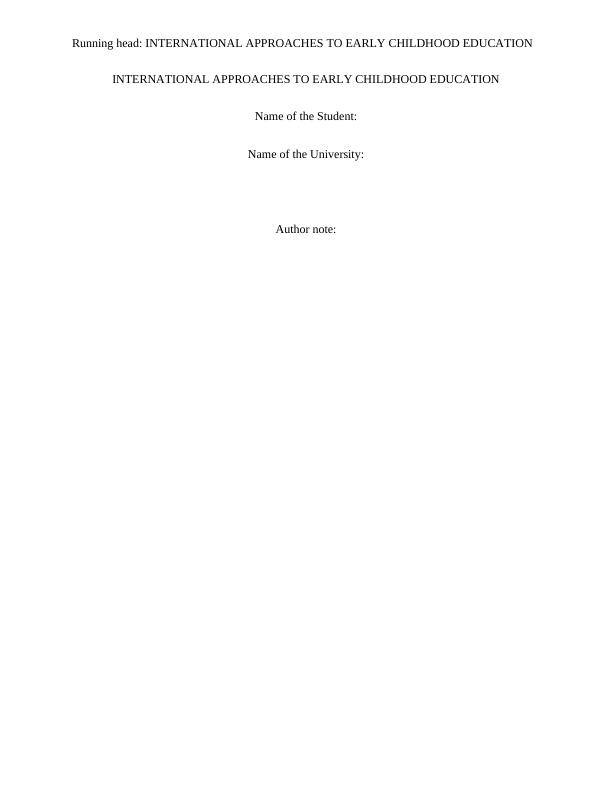
1
INTERNATIONAL APPROACHES TO EARLY CHILDHOOD EDUCATION
Table of Contents
Introduction......................................................................................................................................2
Rationale and context......................................................................................................................3
Implication and types of play in the early years of childhood.........................................................7
Significance of playing in children's learning in early childhood development..............................9
Piaget's stages of cognitive development theory...........................................................................12
Vygotsky social constructivist theory............................................................................................15
Legislations related to play in early childhood education: The U.K and Nigeria contexts...........16
Conclusion.....................................................................................................................................20
References:....................................................................................................................................24
INTERNATIONAL APPROACHES TO EARLY CHILDHOOD EDUCATION
Table of Contents
Introduction......................................................................................................................................2
Rationale and context......................................................................................................................3
Implication and types of play in the early years of childhood.........................................................7
Significance of playing in children's learning in early childhood development..............................9
Piaget's stages of cognitive development theory...........................................................................12
Vygotsky social constructivist theory............................................................................................15
Legislations related to play in early childhood education: The U.K and Nigeria contexts...........16
Conclusion.....................................................................................................................................20
References:....................................................................................................................................24
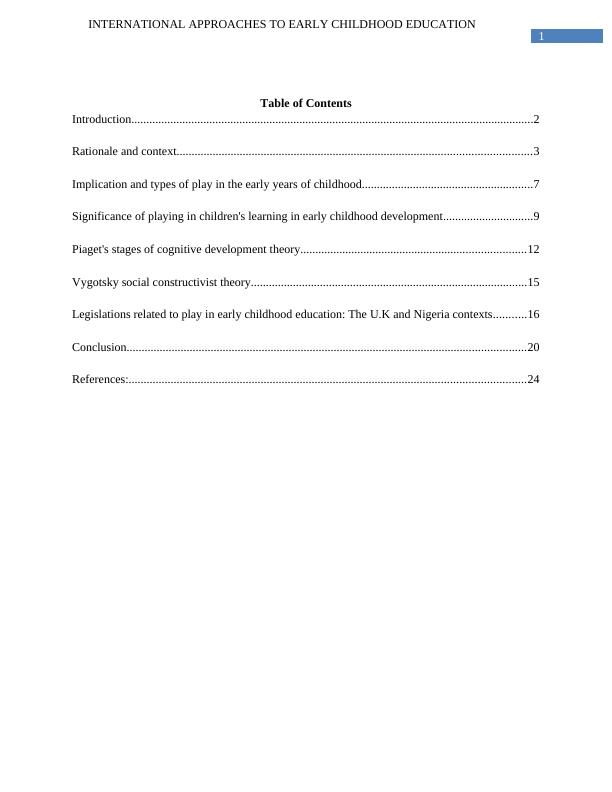
2
INTERNATIONAL APPROACHES TO EARLY CHILDHOOD EDUCATION
The Role of Play in Cognitive And Social Development Of 4 - 5 Years Old Children
Introduction
Studies of Fawowe (2011) have observed that individuals regardless of time and location
have tended to yearn for the existence of young children. Such an endeavour typically involved
ascertaining that young children receives all round development resulting to a satisfying
existence in the broader realm of the society(Obanya, 2011).
During the period of early childhood, the amount of care and encouragement acquired by
the child significantly establishes the level of physical and intelligence growth a child tends to
obtain during the later phase of life(UNICEF, 2008). On the other hand, Bakken, Brown and
Downing (2017) have claimed that preliminary period starting from birth to 5 years as highly
crucial for establishing fundamental bases of thoughts, behavioural patterns along with emotional
welfare. Furthermore, as per the view of child development specialists, it is during early
childhood period that young children develop diverse skills, which envisage children’s
subsequent functioning in numerous domains (Trawick-Smith, 2014; Woolfolk & Perry, 2012).
However, such an impact of early childhood care not only controlled physical and intellectual
growth of young children but further expanded to their social development. Physical
development nonetheless implies to the growth of child’s body whereby the bones resulted to the
growth of weight and mass, intellectual progress implies maturity of intellect along with
linguistic ability while social development identifies development of relationship competence.
Conversely, when diverse aspects of growth have been successfully controlled in development
process of early childhood, the outcome tends to be usually advantageous for healthy growth and
maturity.
INTERNATIONAL APPROACHES TO EARLY CHILDHOOD EDUCATION
The Role of Play in Cognitive And Social Development Of 4 - 5 Years Old Children
Introduction
Studies of Fawowe (2011) have observed that individuals regardless of time and location
have tended to yearn for the existence of young children. Such an endeavour typically involved
ascertaining that young children receives all round development resulting to a satisfying
existence in the broader realm of the society(Obanya, 2011).
During the period of early childhood, the amount of care and encouragement acquired by
the child significantly establishes the level of physical and intelligence growth a child tends to
obtain during the later phase of life(UNICEF, 2008). On the other hand, Bakken, Brown and
Downing (2017) have claimed that preliminary period starting from birth to 5 years as highly
crucial for establishing fundamental bases of thoughts, behavioural patterns along with emotional
welfare. Furthermore, as per the view of child development specialists, it is during early
childhood period that young children develop diverse skills, which envisage children’s
subsequent functioning in numerous domains (Trawick-Smith, 2014; Woolfolk & Perry, 2012).
However, such an impact of early childhood care not only controlled physical and intellectual
growth of young children but further expanded to their social development. Physical
development nonetheless implies to the growth of child’s body whereby the bones resulted to the
growth of weight and mass, intellectual progress implies maturity of intellect along with
linguistic ability while social development identifies development of relationship competence.
Conversely, when diverse aspects of growth have been successfully controlled in development
process of early childhood, the outcome tends to be usually advantageous for healthy growth and
maturity.
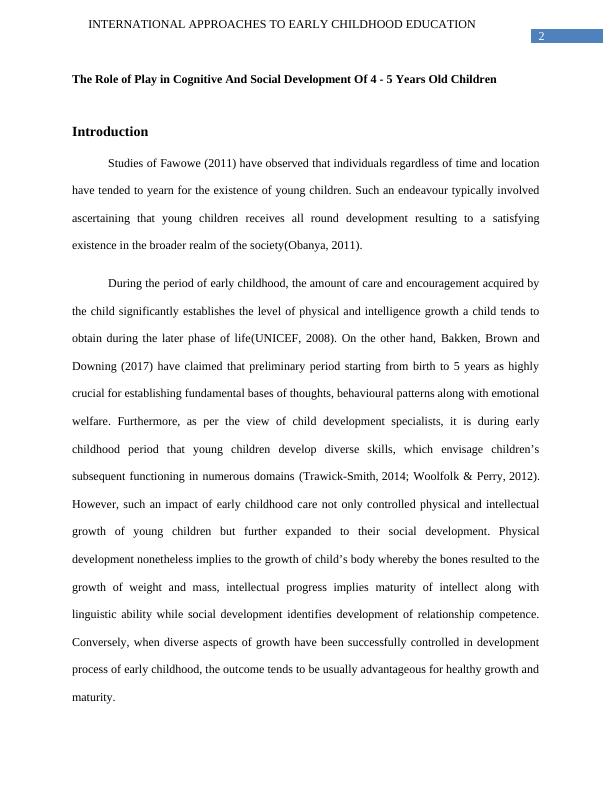
3
INTERNATIONAL APPROACHES TO EARLY CHILDHOOD EDUCATION
Additionally during early childhood, educators, childcare specialists along with parents
align with the idea that young children attain substantial amount of insights and further get
accustomed to new environments. On the other hand, there can be identified varying perspectives
on the way learning has its incidence in children with considerable amount of study on this
aspect. Such perspectives often enable an individual to speculate: Could play, which has been
considered as a natural inclination in young children (Mastrangelo, 2009, cited in Briggs and
Hansen, 2012), as one of the approaches? Or does play or physical activity tend to benefit young
children by any approaches during the period of early childhood. The following paper will aim to
present the rationale and context of work, which will be followed by relevant literature on the
meaning and types of play in the period of early childhood. In addition to this, comprehensive
insights will be gathered on the importance of play in relation to children’s learning.
Further to this, critical evaluation will be conducted regarding the way Vygotsky’s and
Piaget’s theories of development have shaped the understanding of role of play in children’s
cognitive as well as social growth. Moreover, by drawing relevance to the contexts of the United
Kingdom and Nigeria, the following paper will reveal certain legislations in relation to play in
the field of early childhood education along with a study of way play could be incorporated into
early childhood curriculum.
Rationale and context
Several scholars (such as, Goldstein, 2012; Bilton, 2014; Bilton and Waters, 2016) have
been of the opinion that play has been a critical determinant in child’s growth and maturity as it
primarily adds up to the cognitive, physical as well as emotional interests of young children and
youths. Thus, during play, parents and teachers obtain the competence to engage and share
INTERNATIONAL APPROACHES TO EARLY CHILDHOOD EDUCATION
Additionally during early childhood, educators, childcare specialists along with parents
align with the idea that young children attain substantial amount of insights and further get
accustomed to new environments. On the other hand, there can be identified varying perspectives
on the way learning has its incidence in children with considerable amount of study on this
aspect. Such perspectives often enable an individual to speculate: Could play, which has been
considered as a natural inclination in young children (Mastrangelo, 2009, cited in Briggs and
Hansen, 2012), as one of the approaches? Or does play or physical activity tend to benefit young
children by any approaches during the period of early childhood. The following paper will aim to
present the rationale and context of work, which will be followed by relevant literature on the
meaning and types of play in the period of early childhood. In addition to this, comprehensive
insights will be gathered on the importance of play in relation to children’s learning.
Further to this, critical evaluation will be conducted regarding the way Vygotsky’s and
Piaget’s theories of development have shaped the understanding of role of play in children’s
cognitive as well as social growth. Moreover, by drawing relevance to the contexts of the United
Kingdom and Nigeria, the following paper will reveal certain legislations in relation to play in
the field of early childhood education along with a study of way play could be incorporated into
early childhood curriculum.
Rationale and context
Several scholars (such as, Goldstein, 2012; Bilton, 2014; Bilton and Waters, 2016) have
been of the opinion that play has been a critical determinant in child’s growth and maturity as it
primarily adds up to the cognitive, physical as well as emotional interests of young children and
youths. Thus, during play, parents and teachers obtain the competence to engage and share
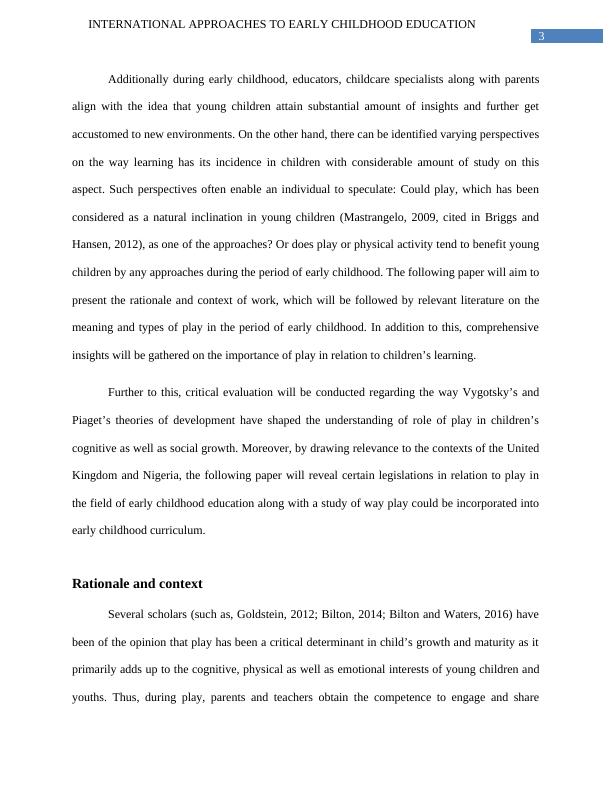
4
INTERNATIONAL APPROACHES TO EARLY CHILDHOOD EDUCATION
quality time with children. Berke (2016) has claimed that children tend to learn most efficiently
when they have been offered the prospect to choose as per their ability and establish
individualistic objectives.
Such an assumption reinforces the claim that play has been an essential part for young
children because it enables them to attain self-regulation and confidence from an early age.
However, it is essential to note that some forms of play such as outdoor games, which involves
risks taking.
This assumption further persuades that adults require guarantee that play offers children
with wide prospects to take ‘safe risk’ in order to benefit their personal learning course.
Nonetheless, regardless of the advantages of play to young children’s learning and healthy
development, some adults consider play as highly ‘non-profitable’ activities and therefore reduce
children’s play. Drawing relevance to these aspects, Ogunyemi and Ragpot (2016) have
speculated that educators and parents with constricted idea of play consider the play activity as
simple physical actions of walking, moving, clapping as well as singing outside class activity.
Meanwhile, for these parents, children are believed to perform ‘serious and productive work’ in
school rather than indulging into playful activities. Consequently, according to Goldstein(2012)
adequate time allocated for free play has radically been declined in educational institutes.
Such a drastic decline further has led to conditions where young children currently
receives less assistance from educators and parents for engaging into play while learning and
also at home. Meanwhile, several scholars, teachers and practitioners consider importance of
play in early childhood period. For instance, Sylva and Pugh (2005) stated that early learning has
the capacity to contribute to the intellect growth and that most basiclearning between child and
INTERNATIONAL APPROACHES TO EARLY CHILDHOOD EDUCATION
quality time with children. Berke (2016) has claimed that children tend to learn most efficiently
when they have been offered the prospect to choose as per their ability and establish
individualistic objectives.
Such an assumption reinforces the claim that play has been an essential part for young
children because it enables them to attain self-regulation and confidence from an early age.
However, it is essential to note that some forms of play such as outdoor games, which involves
risks taking.
This assumption further persuades that adults require guarantee that play offers children
with wide prospects to take ‘safe risk’ in order to benefit their personal learning course.
Nonetheless, regardless of the advantages of play to young children’s learning and healthy
development, some adults consider play as highly ‘non-profitable’ activities and therefore reduce
children’s play. Drawing relevance to these aspects, Ogunyemi and Ragpot (2016) have
speculated that educators and parents with constricted idea of play consider the play activity as
simple physical actions of walking, moving, clapping as well as singing outside class activity.
Meanwhile, for these parents, children are believed to perform ‘serious and productive work’ in
school rather than indulging into playful activities. Consequently, according to Goldstein(2012)
adequate time allocated for free play has radically been declined in educational institutes.
Such a drastic decline further has led to conditions where young children currently
receives less assistance from educators and parents for engaging into play while learning and
also at home. Meanwhile, several scholars, teachers and practitioners consider importance of
play in early childhood period. For instance, Sylva and Pugh (2005) stated that early learning has
the capacity to contribute to the intellect growth and that most basiclearning between child and
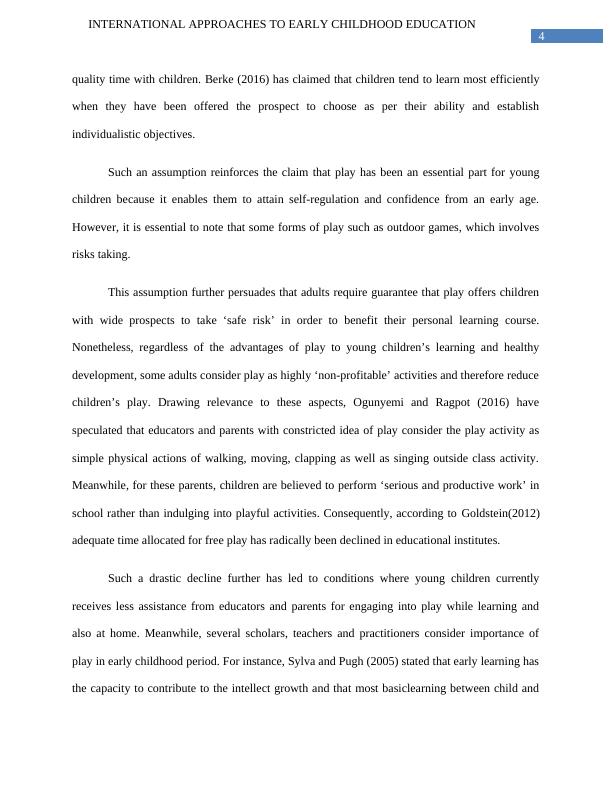
5
INTERNATIONAL APPROACHES TO EARLY CHILDHOOD EDUCATION
child carers offer the cultural structure further supporting the growth of intellectual
representations. Thus, drawing reliability from these evidences, authors have mentioned in Sylva
and Pugh (2005) which claims that for provisions aimed for three years onwards, the indication
has been reliable that school provisions has been constructive for educational as well as social
development for the entire populace.
Recent studies of Whitebread, Basilio, Kuvalja, and Verma, 2012; Ogunyemi and Ragpot
(2016) have highlighted the areas of concerns regarding the importanceof superior quality care
and education of children aged 0 to 8 years. Such concerns have acquired substantial attention,
resulting to investigate into the methods of attaining effective outcomes. However the increased
consideration of the significance of early childhood education has shed light on the need to
develop effectual as well as resourceful teaching strategies along with procedures which would
aid young children to successfully obtain education in the foundation years. It has been because
of such advocacy in early childhood education growth and care that ‘play’ has been seen as an
essential factor in teaching young children.
At this juncture Ogunyemi and Ragpot (2016) have focused on how play has sustained as a
recognised but debatable theory among early childhood education researchers as well as
practitioners and parents specifically in developing nations including Nigeria. These scholars
have been strategic using renowned playgroup school rhyme in Nigeria: “Work while you work
and play while you play to be useful and happy, this is the way” in order to enlighten the claim
further. According to the early childhood practitioners of Nigeria, this rhyme reveals a distinct
departure of the concepts play from work. It has been noted that the concept of play essentially
represents activities a child usually does during his or her leisure time whereas the latter has been
explained as classroom activities. Meanwhile another renowned nursery poem which must be
INTERNATIONAL APPROACHES TO EARLY CHILDHOOD EDUCATION
child carers offer the cultural structure further supporting the growth of intellectual
representations. Thus, drawing reliability from these evidences, authors have mentioned in Sylva
and Pugh (2005) which claims that for provisions aimed for three years onwards, the indication
has been reliable that school provisions has been constructive for educational as well as social
development for the entire populace.
Recent studies of Whitebread, Basilio, Kuvalja, and Verma, 2012; Ogunyemi and Ragpot
(2016) have highlighted the areas of concerns regarding the importanceof superior quality care
and education of children aged 0 to 8 years. Such concerns have acquired substantial attention,
resulting to investigate into the methods of attaining effective outcomes. However the increased
consideration of the significance of early childhood education has shed light on the need to
develop effectual as well as resourceful teaching strategies along with procedures which would
aid young children to successfully obtain education in the foundation years. It has been because
of such advocacy in early childhood education growth and care that ‘play’ has been seen as an
essential factor in teaching young children.
At this juncture Ogunyemi and Ragpot (2016) have focused on how play has sustained as a
recognised but debatable theory among early childhood education researchers as well as
practitioners and parents specifically in developing nations including Nigeria. These scholars
have been strategic using renowned playgroup school rhyme in Nigeria: “Work while you work
and play while you play to be useful and happy, this is the way” in order to enlighten the claim
further. According to the early childhood practitioners of Nigeria, this rhyme reveals a distinct
departure of the concepts play from work. It has been noted that the concept of play essentially
represents activities a child usually does during his or her leisure time whereas the latter has been
explained as classroom activities. Meanwhile another renowned nursery poem which must be
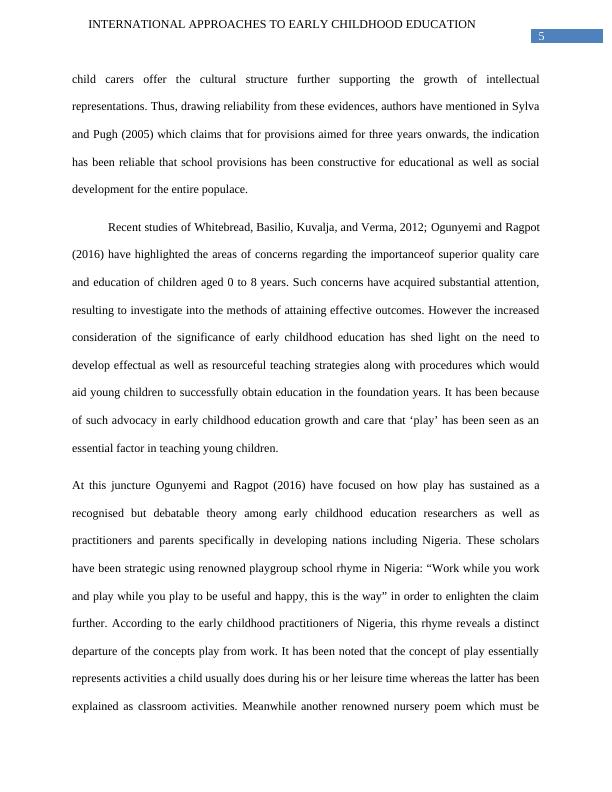
End of preview
Want to access all the pages? Upload your documents or become a member.
Related Documents
Role of Family in Early Childhood Education and Carelg...
|8
|2184
|350
Importance of Play in Child Development: Examining through Various Theories of Playlg...
|7
|624
|109
An Approach To Early Childhood Education Research Paper 2022lg...
|7
|1766
|20
Assignment on Wellbeing of A Childlg...
|9
|2250
|28
Importance of Early Childhood Education and Parental Involvementlg...
|17
|4443
|190
Critical Analysis of Teaching and Learning in Early Childhood Educationlg...
|13
|3777
|497